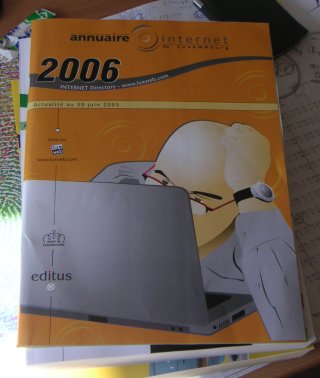 My colleagues Ivan Hermann and Richard Ishida are sharing some experiences from the "old time", when traveling into (and out of) Hungary meant crossing borders and facing guard dogs and Kalashnikovs. Hungary is now a Schengen state, which means that crossing its border toward Austria is as easy as crossing the borders between Luxembourg and Germany, or Luxembourg and France, or France and Germany -- in short, the borders that meet around the little village of Schengen that has given its name to the contract, just a few dozen kilometers south of where I now live. I often tell of the marks that remind of past floodings in nearby Sierck-les-Bains, and how they change languages, testimony to just often war ravaged this area, how often borders moved here, and how absurd they are to the people who live on them.
My colleagues Ivan Hermann and Richard Ishida are sharing some experiences from the "old time", when traveling into (and out of) Hungary meant crossing borders and facing guard dogs and Kalashnikovs. Hungary is now a Schengen state, which means that crossing its border toward Austria is as easy as crossing the borders between Luxembourg and Germany, or Luxembourg and France, or France and Germany -- in short, the borders that meet around the little village of Schengen that has given its name to the contract, just a few dozen kilometers south of where I now live. I often tell of the marks that remind of past floodings in nearby Sierck-les-Bains, and how they change languages, testimony to just often war ravaged this area, how often borders moved here, and how absurd they are to the people who live on them.
While I never crossed the Hungarian part of the iron curtain when it was still up, the most lasting memory of my first time in Berlin - a school trip, in the last week of August in 1989, just weeks before the DDR started collapsing - was our one-day visit to the eastern part of the city. I believe that we took the subway from somewhere in Western Berlin (not the S train from Zoo as we did last week, coming back from chestnuts and Glühwein and a look at Kurfürstendamm). I remember our passing (in 1989) through badly-lit, machine gun and camera infested, but otherwise abandoned, stations on the Eastern side (without even slowing down); finally, the train stopped at Friedrichstrasse, which I once again remember as a fairly colorless affair. What I remember of the border controls that followed are grey and somewhat claustrophobic corridors, and a distinctive sense of fear; the details have all become fuzzy. We were all glad when we finally emerged from Bahnhof Friedrichstrasse. Back then, it was known as the palace of tears: This was where Eastern and Western relatives would kiss good-bye, and where following across the border was suicidal for those from the East. (Needless to say, we were rather happy when we made it back to the West that night.)
This New Year's eve, we passed through Bahnhof Friedrichstrasse many times, by subway, S train, and walking. Going from Friedrichstrasse toward the Reichstag (and further along what's now known as the street of 17 June), we walked across what was once the deadly strip around the Berlin wall. That night, the Brandenburg gate was off limits only because there were too many people there. It's normal like that now, and it has always been like that for those who will first attend an election this year.
It's normal like that now, and it has always been like that for those who will first attend an election this year.
The accession to Schengen of Hungary and other countries that used to be on the eastern side of the iron curtain means that, soon, not having to show one's papers when one crosses a border will be normal for them, too. And that's really great.
Yet, it's important to remember that the world hasn't always been like this. That there were times when borders were insurmountable, when moving from one country into another meant risking one's life, for those who had ended up on the wrong side of that border; and that there are indeed borders in this world of which that's still true.
That's why stories like Richard's and Ivan's are so important, and why I dug out that almost 20 year old photo of the Brandenburg gate from a pile of old pictures.



 From the Arrow Books edition of Hemingway's The Old Man and the Sea:
From the Arrow Books edition of Hemingway's The Old Man and the Sea: (Almost)
(Almost) 




 May 25 is pangalactic
May 25 is pangalactic 




